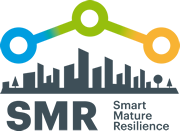Resources
STANDARDIZATION FOR CITY RESILIENCE
Through involvement of German standardization institute DIN, the project developed three CEN Workshop Agreements based on the project outputs. The standardization process brought external participants into the process of documenting their tools and benefits. The outcomes of these workshops were reported back to the project’s co-creation process. The CEN Workshop Agreement Series on City Resilience Development intends to support cities in building resilience to various kinds of threats. The series consists of:
- CWA 17300 City Resilience Development – Operational Guidance;
- CWA 17301 City Resilience Development – Maturity Model;
- CWA 17302 City Resilience Development – Information Portal.
The CEN Workshop Agreements are free to download at the following website: https://www.cencenelec.eu/research/CWA/Pages/default.aspx
The European Resilience Management Guideline and the Resilience Maturity Model underwent significant revisions following advice from project-external participants of the standardization process. The activities included in the various operational steps of the European Resilience Management Guideline were specifically co-designed and included in each step, following consultation with participants that ensured relevance and applicability to local governments and their stakeholders across Europe. The standardization activities in the project made it possible to make the research results available to a wider public and to ensure the alignment of similar city resilience related initiatives. Currently the uptake of these standards to international level is foreseen by the ISO/TC 268 Sustainable Cities and Communities.
The CWA on Operational Guidance is the overarching document that refers to the CWA 17301, CWA 17302, as well as to other supporting tools. An overview of the standard series and some user views can be found below:
STANDARDS SERIES
CWA 17300 City Resilience Development – Operational Guidance
This CEN Workshop Agreement (CWA)defines an operational framework for cities that provides guidance on local resilience planning and supports their efforts in building resilience. The document is intended to be used by policy and decision-makers at city level and councilors working for climate change adaptation and resilience in their city, as well as by any other city stakeholder working on resilience (for examples but not limited to: critical infrastructure managers, service providers, emergency services, the media, civil society associations, non-governmental organizations, academic and research institutions as well as consultancies). The Operational Guidance consists of five steps that have to be repeated regularly. The five steps implemented in a full cycle are the following: Baseline Review, Risk Awareness, Resilience Strategy, Implementation and Monitoring, Evaluation and Reporting.
CWA 17301 City Resilience Development – Maturity Model
The aim of the Maturity Model is to provide a tool for reflection and guidance on the resilience-building process of cities, which will enable them to compile an analysis of their current resilience status. It is primarily designed to assist local governments in assessing their current maturity stage and to identify future resilience demands and capacities needed to advance to a more mature level. The Maturity Model defines five incremental stages, which guide local governments through the ideal path for building-resilience: Starting, Moderate, Advanced, Robust, and Vertebrate. Each of these maturity stages includes a description of the objectives of each stage, the stakeholders actively involved in each maturity stage, and a list of policies that should be followed.
CWA 17302 City Resilience Development – Information Portal
This CEN Workshop Agreement (CWA) provides a list of requirements and recommendations for how municipalities should equip an information system that facilitates resilience building through collaboration, communication, and engagement. This marks the functional specification of a Resilience Information Portal (RP). The portal is a platform for communication within a local government, between a local government and its overall stakeholders, and between a local government and citizens. Requirements aim towards a broad-purpose, easy-to-use platform that provides versatility and flexibility.
Subscribe to our newsletter

This project has received funding from the European Union’s Horizon 2020 research and innovation programme under grant agreement no. 653569.





